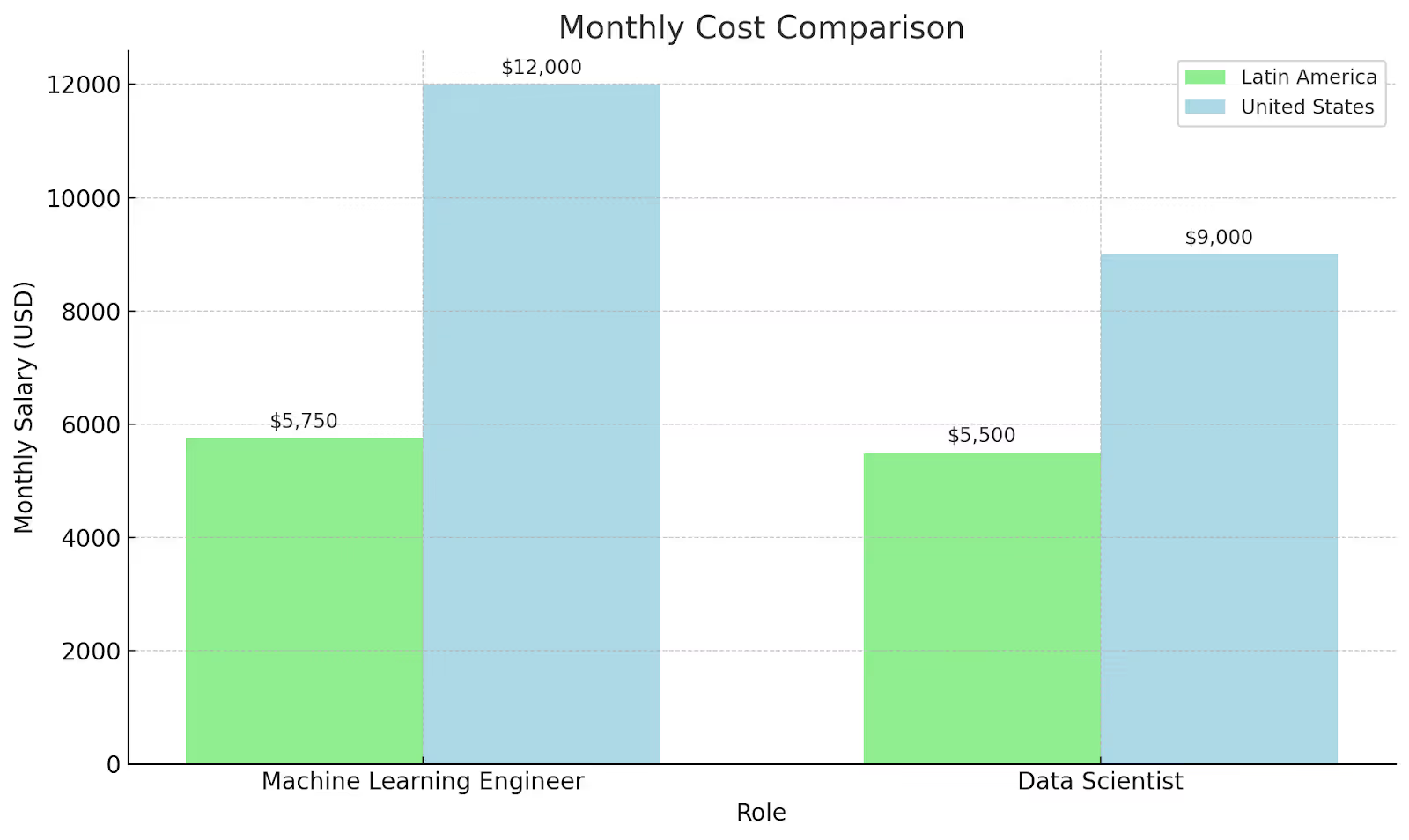When it comes to building a successful data-driven business, hiring the right people is critical. If you're thinking about adding machine learning engineers and data scientists to your team, you're on the right track. These professionals are at the forefront of technology, enabling companies to use data to drive innovation, efficiency, and growth. But how to hire machine learning engineers and data scientists can be a challenging process.
In this blog, we’ve broken down everything you need to know about hiring these experts, from understanding their key roles and skills to the benefits they can bring to your organization. Whether you're looking to enhance your product, improve decision-making, or automate processes, hiring the right talent can make all the difference. By knowing how to hire machine learning engineers and data scientists effectively, you’ll set your organization up for long-term success and innovation.
Understanding the roles
First off, it’s important to know that machine learning engineers and data scientists are slightly different, though they often overlap in the skills they bring to the table.
Machine Learning Engineers specialize in creating algorithms and models that enable machines to improve and learn autonomously, without explicit programming. They design systems capable of predicting, classifying, and making decisions based on data, and are responsible for deploying and scaling these systems. As the demand for machine learning continues to rise, the market for these technologies is expected to reach US$105.45 billion by 2025, highlighting the growing importance of skilled professionals in this field.
Data Scientists, on the other hand, analyze and interpret complex data to help businesses make informed decisions. They specialize in identifying patterns, trends, and correlations in large datasets. While they often use machine learning techniques, their primary focus is on data exploration and analysis. According to DevSkiller assessments, data scientists worldwide showed varying levels of proficiency across different skills, with CSV handling emerging as the most proficient skill, reaching an advanced-level score of 73.

Benefits of including these profiles in your team
Hiring machine learning engineers and data scientists isn’t just about checking off a box on your tech roadmap—it’s a strategic move that can reshape how your business operates, competes, and grows. When it comes to how to hire machine learning engineers and data scientists, it’s important to understand the significant impact they can have on your organization.
Smarter Decision-Making: Data scientists turn raw data into actionable insights. With their help, you can back your business decisions with hard evidence rather than gut instinct, leading to more precise strategies and better outcomes.
Operational Efficiency: Machine learning engineers design systems that automate time-consuming tasks, reduce manual errors, and optimize resource allocation. This automation lowers operational costs and frees your team to focus on more strategic work.
Enhanced Product: With data-driven models, you can tailor experiences to your customers like never before. Whether personalized recommendations, dynamic pricing, or predictive maintenance, ML engineers and data scientists enable innovation that sets you apart from competitors.
Top Talent: These professionals can build models that forecast trends, customer behavior, and even market shifts. This foresight helps your company stay ahead of the curve and respond proactively instead of reactively.
Lower costs: Especially when you tap into nearshore or remote hiring strategies, you can access top-tier talent at significantly lower costs compared to local markets. This allows startups and growing companies to scale up their data capabilities without exhausting their budget.
Are you looking to hire? Learn more about Hire a Data Scientist.

Comparison of ML Engineer and Data Scientist Skills
Machine learning engineers start with a strong programming background, typically in languages such as Python, Java, or C++. They often work with deep learning frameworks such as TensorFlow, PyTorch, and Keras to develop and refine machine learning models. In addition, machine learning engineers must be skilled in deploying and scaling models, often using tools such as Docker, Kubernetes, and cloud platforms such as AWS or Google Cloud. As part of their responsibilities, they also work with data processing tools such as Hadoop and Spark to efficiently handle large data sets.
On the other hand, data scientists need a solid foundation in statistics and advanced mathematics. They are experts in probability, linear algebra, and calculus, all of which are critical to analyzing and interpreting data. Programming is another essential skill for data scientists, and proficiency in languages such as Python, R, or SQL is key to manipulating and analyzing data. A data scientist must also be well-versed in data visualization tools such as Tableau or Power BI, as their role often involves presenting complex data in a format accessible to decision makers. In addition, data scientists must have expertise in machine learning, especially in the context of predictive modeling, to identify trends and predict future data patterns.
Find out more about hiring machine learning engineers.
Things to consider for successful hiring
While hiring the right candidates is key, the recruitment process for these roles can be tricky. To ensure a successful hiring process, there are several crucial factors to keep in mind when deciding how to hire machine learning engineers and data scientists. These professionals not only require technical expertise but also need to align with your company's specific needs and culture. Here are a few tips to guide your hiring process:
Understand the Requirements: Before you start the hiring process, take the time to clearly define what you need. Do you require a machine learning engineer who focuses on building AI-driven models and systems, or a data scientist to help analyze and interpret large datasets? Being specific about the role you need will help streamline your search and attract the right candidates.
Look Beyond Just Skills: While technical proficiency is essential, it’s equally important that your machine learning engineer or data scientist can communicate their findings clearly. Many times, these professionals need to present complex data insights to stakeholders who may not have a technical background. Look for candidates who can bridge the gap between technical execution and strategic decision-making by effectively conveying their insights in a comprehensible way.
Cultural Fit: Don’t underestimate the importance of a candidate fitting into your company culture. The best machine learning engineers and data scientists not only excel at their technical tasks but also collaborate effectively with other teams and contribute to the overall success of the business.
Learn more about the Top 10 Nearshoring Agencies for Data Scientists.
FAQ
How to Hire Machine Learning Engineers?
Hiring machine learning engineers starts by understanding the specific needs of your project. Once you’ve defined your needs, look for candidates with strong programming skills, knowledge of machine learning algorithms, and experience with deployment frameworks.
Can a Data Scientist Be an ML Engineer?
Yes, there is overlap, especially since both roles work with data and algorithms. However, while data scientists often focus on analyzing data and building models, ML engineers specialize in turning those models into scalable applications. A data scientist with the right engineering skills can transition into an ML engineer role, though they may need additional training in deployment and scaling.
How Do I Hire an Engineer?
Hiring a machine learning engineer involves similar steps to hiring for any technical position. Start by creating a clear job description and outlining the required skills and experience. Next, source candidates via job boards, recruitment agencies, or your network.
Why Should I Hire a Data Scientist?
A data scientist brings immense value to any company by transforming raw data into actionable insights. Whether you’re looking to improve customer experience, optimize operations, or drive growth, a data scientist’s expertise can help you unlock the full potential of your data.
Conclusion
Knowing how to hire machine learning engineers and data scientists is crucial for any company looking to fully leverage the value of its data. These professionals bring not only advanced technical knowledge but also the ability to transform information into strategic decisions, automate processes, and drive innovation. Understanding their roles, skills, and how they fit into your team will enable you to make more informed hiring decisions. If you're ready to boost your company's growth with AI and data analytics, hiring the right talent is the first key step. To help you make the best decision, use the calculator below to estimate your costs and potential savings. For more details and personalized advice, please contact us.







